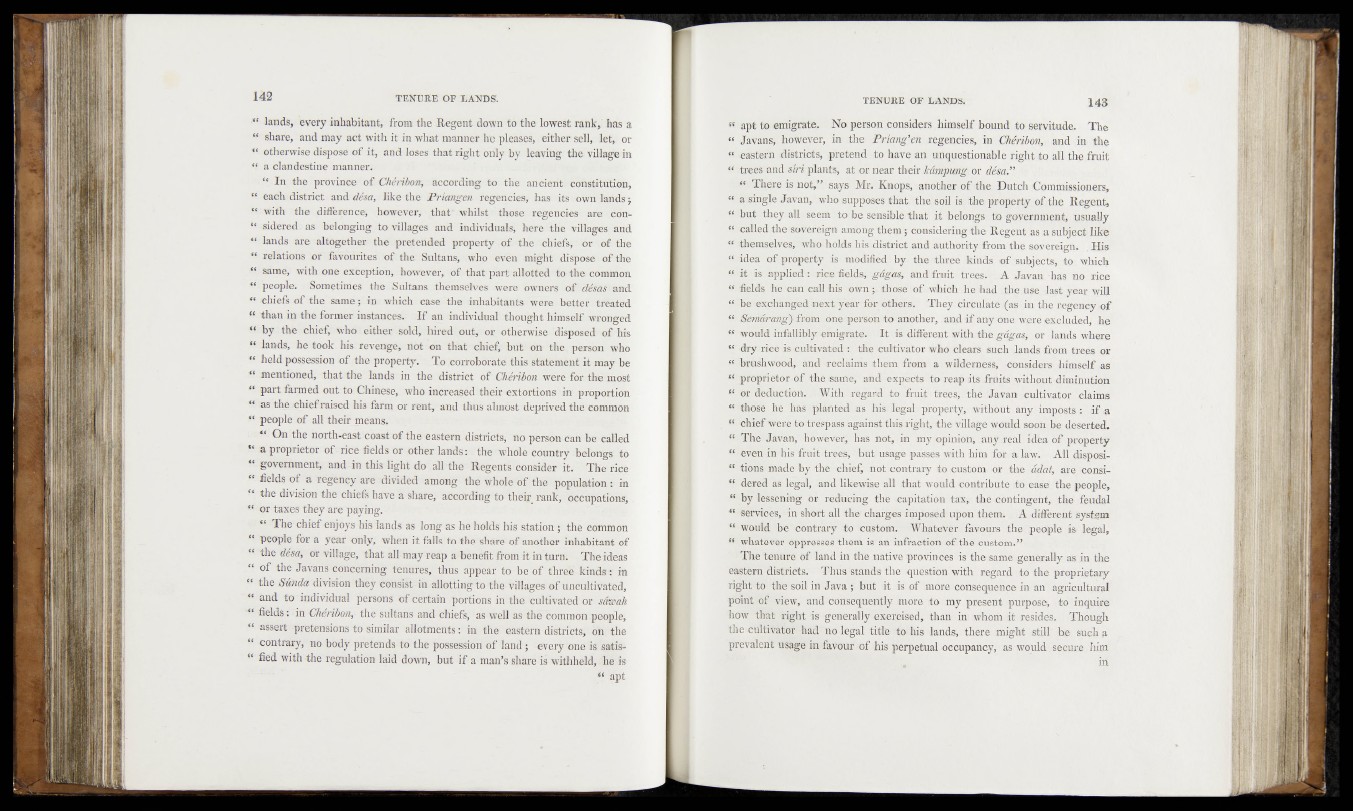
'** lands, every inhabitant, from the Regent down tóthe lowest rank,' has a
’** share, and may act with it in what manner h'e pleases, either sell,: let,, or
f‘ otherwise dispose of it, and loses that rightonlyby leaving the viliagein
*f a clandestine manner*
“ In the province off CAériboa, according to the ancient constitution,
** each-district and désa, Ike the Prkmgen regencies, has its own lands;
” with the difference, however, that " whilst those regeneies are cott-
sidered as belonging to villages and individuals, here the villages and
lands are altogether the pretended property of the ehiefsj. or of thé
“ relations or favourites of the Sultans, who ©Wén -might dispose ofthe
H same, with one exception, however, of that'part« allotted to-the-common
■«people:. Sometimes the Sultans themselves were owners oi^déè&s^Lrti
chiefs of the same; in which ease the inhabitants were better treated
“ than in the former instances. I f an individual thought himself wronged
“ by the chief, who eifcher sold, hired out, or otherwise disposed of his
** lands, he took his revenge, not on that chiefs but on the, person who
** held possession of the property. To corroborate this statement it may be
mentioned, that the lands m the district of Ciïiéribon were for the: most
“ Part formed out to Chinese, who increased their extortions'®» proportion
** as t&ecpefiraisedi hts farm or rent, and thus- almost deprived the common
** people of dll their means.
" Chi the north-east coast of the earterndistricts, »#■ person can becaléd
m a proprietor of-rice fields or other lands: .the whole country:belongs to
“ government, and in this light do alltbe Regents consider it;' The-rice
“ fields of a regency are divided among the whole of the population s in
the division the chiefs have a share, according to theif_ rank, occnpationsi
“ or taxes they ade paying.-T
H The chief enjoys his lands as long as he holds bis station ; the common
“ péöpie for a year only, when it falls to the share of another inhabitant of
te-iMe désa, öt village, that all-may reap a'-benefit from it in turn': The ideas
“ of the Javans'Concerning tenures, thus appear toTie off three • kinds: in
“ ^be Sunda division they consist in allotting to the villages -of uncultivated,
“ and -° individual persons of certain portions in the cultivated or satwah
“ belds: in GMribon,- the' sultans and chiefs, as well as the common .people,
■ assert pretensions to similar allotments: in the eastern districts, oil /.the
“ contrary, no body pretends to the possession óf land 5 everyone is safis-
** bed with -the regulation laid down, but if'a-man’s share is withheld, -hé is
: .Tllpt.
« apt to emigrate. ,N® person nonsii^rs himself hound to servitude, The
“ -Javans,; however, in .fih-e Pmarighn,, regencies, in , Chéribm, .and in the
n «ast'effh districts, pretend to have :an unquestionable right to all the fruit
“ -trees and 'siriplants, at or.near theirMmpmgior désa” ff
» There is not,” says Mr. Knops, •an@tiae(E<ló£''tbe Patch «Commissioners,
u a-single Javan, who supposes that., theisqil rsj/fbe; property, o f the Regent
but they all seem to be sensible that it 'beJor^jSrfo government, usually
-called the =isös5erjeigïi among them; considering the Regent as a subject- like
u themselves,'-"-who holds bis'district -and authority:fr am the sovereign. . His
i'tëdea-'of property as -modified* by the three kinds' of-subjects, to, which
vdt-iüs applied: rice 'fields,! „gagas, and fruit frees.', A Java®, has n© nice
«■.’fields he can call his own those .of which he h a d ,the.use. last .year wi-ljl
«Te exchanged ‘»exfiyear-forjothers, iTheylcfccnfoféajaf 5®; the/fiegency^jf
« S&rmran'g^ from 5he -peteon to another, and if any one were ©xglpded, h©
* would infal-liMy,'.emigrate.r ' It is different With the .gqg&s, or lands where
“ dry «rice-lis cultivated: the cultivator, who clears -such lands from trees or
« hr-u&wotd5->a'ndjTodaims them from a Wilderness, contiderg. himself -as
w and expects to reap its jfcüits withput-dimihuticp
« Of afedhctioh'.' With regard to fruit trees, „ the Tavan eultiv;a|off -claims
« those hé has - planted as his.legd property, without apy’ imposts: iff#
“ öÉfgif wfere to trespass -against this .righ t, -the village would soon be deserted.
has not, in my -opinion^ nay ffea-l1' idfea, bf property
« -éven- in^ia ffük - trees, ‘ but -usage passes with him for fa -, la wi AH disposi-
«■fionfeimade' by the chief not contrary to custom or hbfe. ddat, are c-oitsi-
« dered as legal, and likewise all that- would contribute $0 ease the people,
« by listening Or reducing thé capitation tax, theueontingent, the- feudal
•” services, in'short all the charges ipaposed upon them. A different system
would %e contrary -toteustom. Whatever favours l the tpeople da- legal,
(f whatever ’Oppresses them is‘an infraction iff: the’ custom.”
‘The ten tire of- land in the native provinces '.is the-same generally as in the
eastern-districts. Thus stands the question’with' regard -fo the proprietary
right-fo thé1 söil in Java ;- but it is of .more consequente in an agricultural
point of view, and consequently more to my present pm-pose, to inquire
how that right is generally exercised, than in whom it resides. Though
the cultivator had no legal title to his lands, there might still be such a
prevalent usage in favour of -his perpetual occupancy, as would -secure him
in